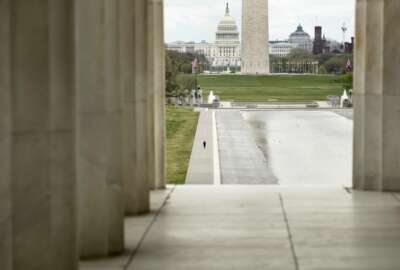
Congress trying to figure out operating in midst of coronavirus pandemic
In today's Federal Newscast, the Senate looks to shore up its cyber defenses, and House leaders are weighing the options to have members cast votes away from Captol...
To listen to the Federal Newscast on your phone or mobile device, subscribe in PodcastOne or Apple Podcasts. The best listening experience on desktop can be found using Chrome, Firefox or Safari.
- As lawmakers talk more and more about doing their job virtually, the Senate wants to batten down its cyber hatches. The Senate Office of the Sergeant at Arms needs help shoring up its cyber defenses. The CIO’s office issued a sources sought notice looking for vendors who can provide cybersecurity services ranging from insider threat assessments to hunting capabilities to detect the presence of an advanced bad actor. The end goal of these services is for the vendor to provide relevant, comprehensive and actionable improvement recommendations to refine and continue maturing the Senate Sergeant at Arms’ cybersecurity defense program. Responses to the RFI are due April 30.
- House leadership weighs in on efforts to have members cast votes away from Captol Hill. The House expects to vote Thursday on a rule change to allow some members to vote by proxy during the pandemic. But House Majority Leader Steny Hoyer (D-Md.) urges the rules and administration committees to take the next step and allow video-conferencing to conduct hearings and cast floor votes. Meanwhile House Minority Leader Kevin McCarthy (R-Calif.) has asked Speaker Nancy Pelosi (D-Calif.) for further details on the vote by proxy plan, including how committees will mark-up fiscal 2021 spending bills.
- The Senate passed another $484 billion emergency coronavirus bill. The bill injects another $320-billion in the Small Business Administration’s Paycheck Protection Program. It also gives SBA an additional $2 billion to administer the program. The Department of Health and Human Services will get over $100 billion to send to state governments and hospitals, plus additional funding to oversee coronavirus testing capabilities across the country. The House is expected to pass the emergency bill.
- A high ranking senator wants the Government Accountability Office to investigate SBA. Sen. Gary Peters (D-Mich.) wrote a letter to GAO asking for an audit of its paycheck protection program. Peters said auditors should review the policies, procedures and criteria SBA and its lenders used to determine how, and to whom, to issue loans.
- Rep. Jamie Raskin (D-Md.) is calling on the Peace Corps to extend the period of non-competitive eligibility for volunteers to apply for federal jobs. Raskin said he’s concerned about the 7,000 volunteers who recently returned to the U.S. during the coronavirus pandemic. Peace Corps volunteers typically have one year after their deployments to non-competitively apply to open federal positions. Raskin said the Peace Corps should extend this eligibility period to three years. He says the extra time would show support for recently returned Peace Corps volunteers, and help agencies find much-needed talent during the pandemic.
- The Defense Department’s efforts to combat impacts of the coronavirus on military families seem to be working. A new survey by Blue Star Families finds they’re more financially adjusted and there are less issues with housing. Families also report better access to childcare. Children in military families are still having issues. Troops and their spouses report lower grades and increased behavior issues since the coronavirus outbreak. (Federal News Network)
- Moving companies relying on military permanent changes of station will take a big hit now that the Defense Department expanded its stop move order. The American Moving and Storage Association estimates more than $730 million in business will be lost in the months of May and June due to service members staying at their current duty stations to tamp down the coronavirus. AMSA said the moving industry may lose a quarter of its businesses to the economic impact. (Federal News Network)
- The Pentagon said three major medical suppliers will get more than $100 million to boost their capacity to make medical masks. The department said earlier this month it would use the Defense Production Act to increase domestic supplies of N95 masks. DoD is now disclosing the contracts will go to three major companies: 3M, Honeywell, and O&M Halyward. DoD is paying those firms to retool or expand their domestic factories into ones that can make the critical respirators. The department expects the DPA contracts to boost U.S.-based mask production by 39 million over the next three months. (Department of Defense)
- The Census Bureau will field a new survey to gauge the economic and health impacts of the coronavirus pandemic. The Office of Information and Regulatory Affairs this week granted emergency approval for the bureau to conduct the survey within the next 90 days. It’ll gather household data on employment, as well as physical and mental wellness, consumer spending, food security, as well as physical and mental wellness. This data will inform how federal, state and local agencies respond to the pandemic in the coming weeks and months. (Federal News Network)
- The White House looks to bring a host of scientific leaders into the ranks of the federal government. President Donald Trump intends to nominate two new members to his council of advisors on science and technology, and four new members to the National Science Board. The advisory board nominees include Daniel Rus, the head of MIT’s Computer Science and Artificial Intelligence Laboratory. Meanwhile the president’s picks for the National Science Board includes Dario Gil, the director of IBM Research.
- Bill Valdez resigned as president of the Senior Executives Association. SEA said it accepted his resignation last week. Valdez served as the association’s president for nearly four years. The SEA board of directors hasn’t announced an interim president yet. Board Chairman Karl Schneider says SEA will name a temporary president soon. The association hosts an annual ceremony honoring the Presidential Rank Award winners.
- The tug of war between the Social Security Administration and its administrative law judges pulls the agency harder towards the mud. Not satisfied with decisions by the Federal Impasses Panel, the judges’ union files a lawsuit in U.S. District Court, challenging whether the panel is constitutional. Union president Melissa McIntosh calls the panel’s current make-up anti union. The Panel recently ruled that Social Security management was justified in cutting the union’s official time by 90% and limiting judges’ rights to telework.
Copyright © 2024 Federal News Network. All rights reserved. This website is not intended for users located within the European Economic Area.
Eric White
Eric White is news anchor and Federal Drive producer at Federal News Network.
Follow @FEDERALNEWSCAST
Related Stories

Pentagon to use Defense Production Act for $133 million in N95 masks
Related Topics
administrative law judges
All News
Bill Valdez
Census Bureau
Congress
Covid-19
Cybersecurity
Defense Production Act
Federal Newscast
Government Accountability Office
IT Modernization
Jamie Raskin
military families
National Science Board
office of information and regulatory affairs
Peace Corps
personal protective equipment
Senior Executives Association
Small Business Administration
Social Security Administration
Technology



